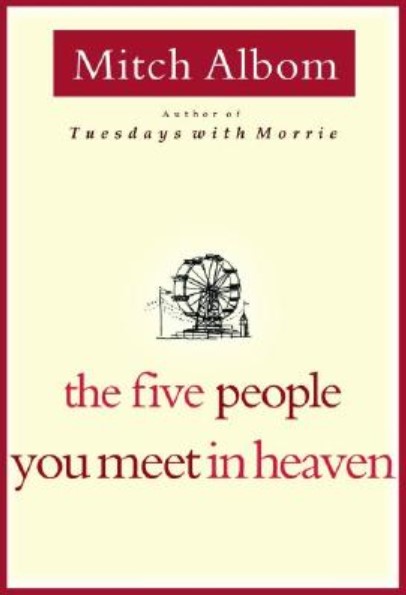
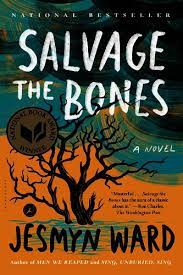
10/10
First and foremost, I must thank my mom for suggesting this book to me. This is the first book I have read by Mitch Albom and it has made it to my top five
favorite book list. Although the title suggests death, Albom has a way with words that makes morbid topics less bleak and somber and more heartwarming.
Albom tells the story of the life of a man named Eddie, beginning, middle, and end. When Eddie's life comes to an end, Albom depicts Eddie in heaven and the five people
who welcome him. These five people were impacted by Eddie's life in some way and each give him a lesson to hold onto in the afterlife. Although the book is about the afterlife,
each lesson from the people Eddie meets in heaven is a lesson for readers about their own life on Earth. My favorite lessons were "holding anger is a poison and its eats you from the inside" and
"every life is significant because all lives are connected". Although these lessons were things I have been told before, I think reading them in this context gave greater emphasis to the significance
of these lessons. This book serves as a reminder that you only have one life on Earth and you should spend it loving others and not holding onto grudges or anger. I wonder who I will meet in heaven and
what lessons will be bestowed onto me. I also wonder who I will welcome to in heaven and what lesson I will teach.
9/10
I read this book after Jesmyn Ward visited my school to answer questions asked by a student panel. From this event, I learned about Ward's academic and writing career and wished I had read one of her books prior to the Q&A.
Anyways, Jesmyn Ward is a remarkable author who is able to convey emotions in a brilliant way. All throughout the novel, I felt as if I was the character going through pain, loss, and fear. Ward has the supernatural ability to make words grab
readers and pull them into the book, into the lives of the characters. I also thought it was brilliant the way Ward made complex parallels between dogs, humans, and motherhood. Every character and every animal was connected in some way in the novel.
What also stuck out to me was the way Ward wrote in a way that in my opinion dehumanized the characters. For example, Ward wrote how the sun "stroked" a character. The word stroke was an interesting word to use and made it seems as if
the character was being "pet" by the sun. I felt as if Ward made very subtle references like this and I wonder if by doing so she wanted to show that animal and humans are one in the same because of shared experiences such as motherhood. Words are intentional and
I ponder about why Ward used certain words like "stroke" in reference to humans. Overall, this book was very well written and I appreciated the challenge as a reader as Ward forces readers to critically think and analyze throughout the entirety of the book. Reading the book was like
hiking to Tiger's Nest. In order to get to the sacred destination, hikers must put in the effort and hard work.
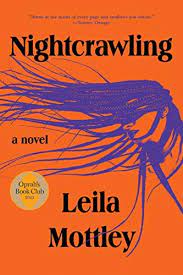
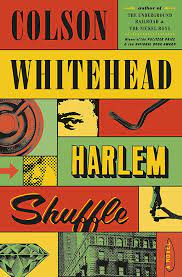
9.5/10
The critics are absolutely spot on: Leila Mottley has poetic superpowers and her talent is undeniable. Nightcrawling confronts racial and economic disparities in Oakland, California through the fictional character Kiara. Without a family she can depend on, Kiara must rely on herself to in order to survive and by mistake finds herself
using her body as a commodity. As Kiara contemplates her decisions, she ultimately justifies it by reminding herself that "it's just a body". Mottley has a recurring theme in her book in which she breaks down the body into pieces, a thumbprint, a mass of limbs, skin, a voice, yet it is never described as a person, but rather an object. Through this writing style, Mottley is able to
demonstrate how society views black women: as objects not humans. However, dehumanizing herself is the only way Kiara believes she can make a living, pay her rent, and feed herself. I would have loved to read this book in one of my classes in college because I am craving a discussion with others about the book. There is a lot to dissect about this book including topics such as motherhood which I thought
to be a prominent theme throughout the book. Aside from the themes and content Mottley writes about, her writing style is unforgettable and I am envious of the way she strings words together to capture emotions and experiences in a way I never though possible. Overall, I had a great experience reading this book and am excited to read more of Mottley's work.
9/10
Harlem Shuffle is 318 pages of demonstrating the effects of systemic power and racism, exposing Harlem's 1960's underground economy, and Whiteheads mesmerizing writing style. This was the first book I have read by Colson Whitehead and I am eager to read more. He intertwines the past and present throughout the book similar to a DNA molecule, two strands, one present and the other the past, spiraling to form a
double helix. Similar to his writing style, the book is rich with other dichotomies such as the black city and the white city
and the straight and crooked people
. While the book tries to differentiate two kinds of people, the ultimate conclusion is that all the characters are the same. The characters all live in the same city that runs on exploitation, grudges, and payback and there is a little crooked in
everyone. Regardless if one lives below 125th street, the characters can not escape the systemic power and racism that is the foundation to the city's crookedness.
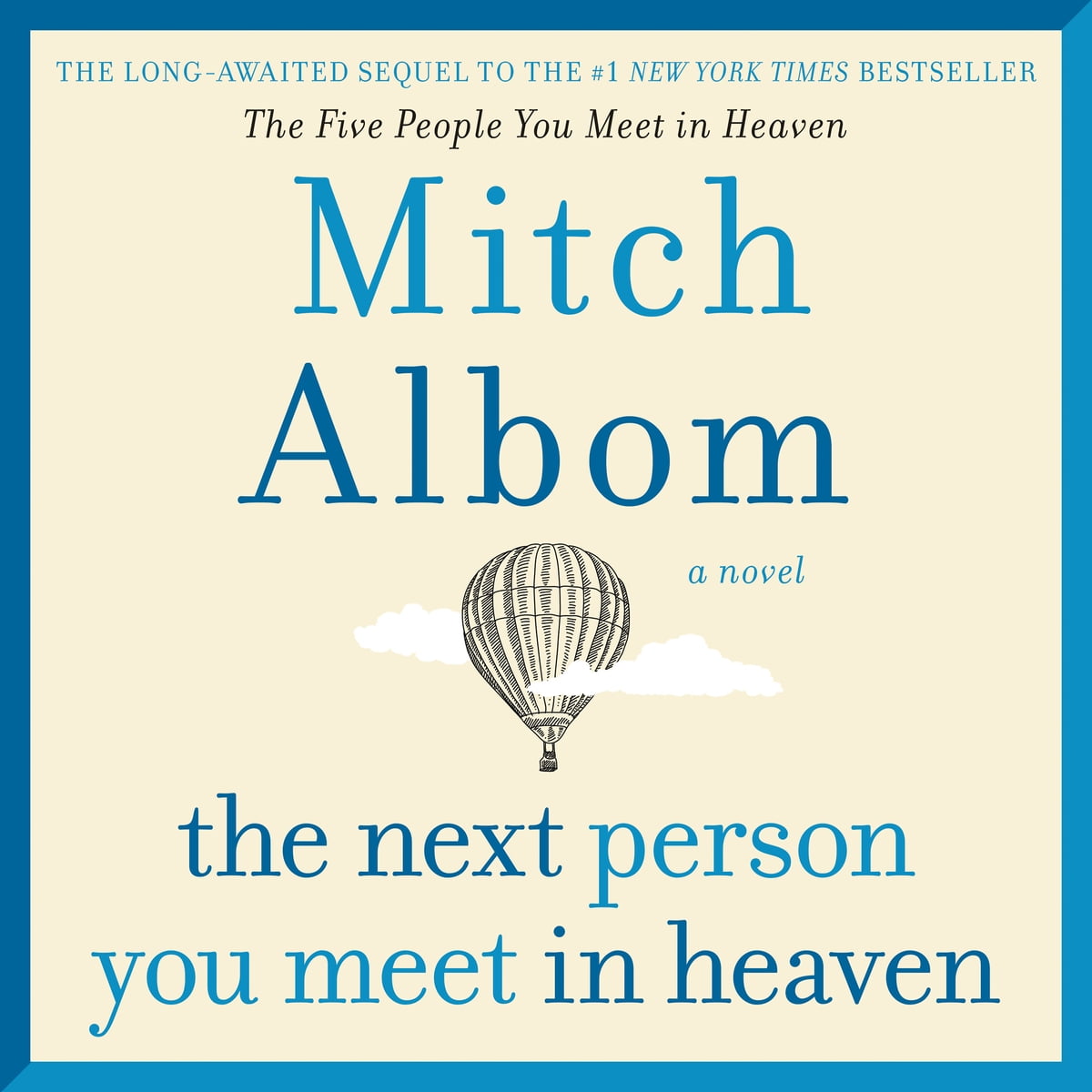
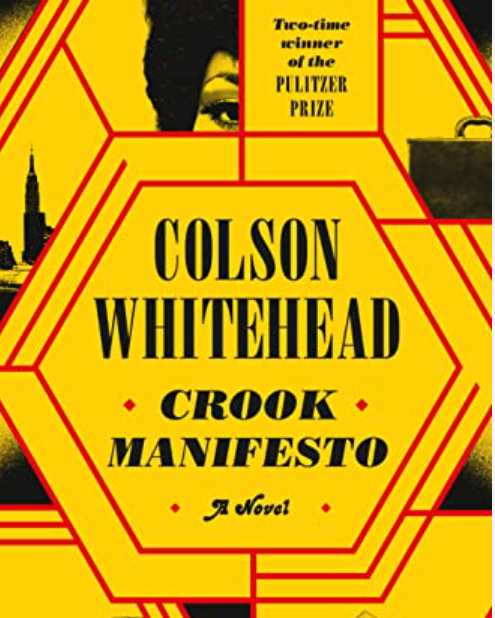
8/10
The lessons transcribed in "The Next Person you Meet in Heaven" by Mitch Albom are very reminiscent of its predecessor, "The Five People You Meet in Heaven". While similar in many ways, I really enjoyed reading another Mitch Albom book and experience, again, how he expresses life lessons and wisdom through fictional characters and storylines. Although some might not agree, I believe he expresses these lessons in a non cliche way
which is what draws me to his writing. I had almost gotten through to the end of the book without crying, but during the last twenty pages, the dam burst. Albom's writing builds a connection with his readers and characters, eliciting emotions from the audience, the ultimate goal of an author.
9/10
"Crook Manifesto", the sequel to its predecessor, "Harlem Shuffle", follows the life of Ray Carney and Harlem's residents as they try to navigate through the inescapable crooked way of life. Colson Whitehead captures New York City history, exposes corruption, and emphasizes racial inequity through a unique writing style that places readers at the center of the crime scenes. When it comes to Whitehead's writing, readers can never guess what
will happen next. He is explosive in his writing, creating climatic scenes that keep the readers on their toes and eager to consume the rest of the pages that follow. Whitehead's writing is also challenging. He writes in a very poetic and non-linear fashion that challenges his readers to pace their reading, reflect, and critically think about the characters, the plot, and his message. While this is not a book I would take with me on vacation,
I enjoyed my reading experience and am eager to read more of Whitehead's novels.